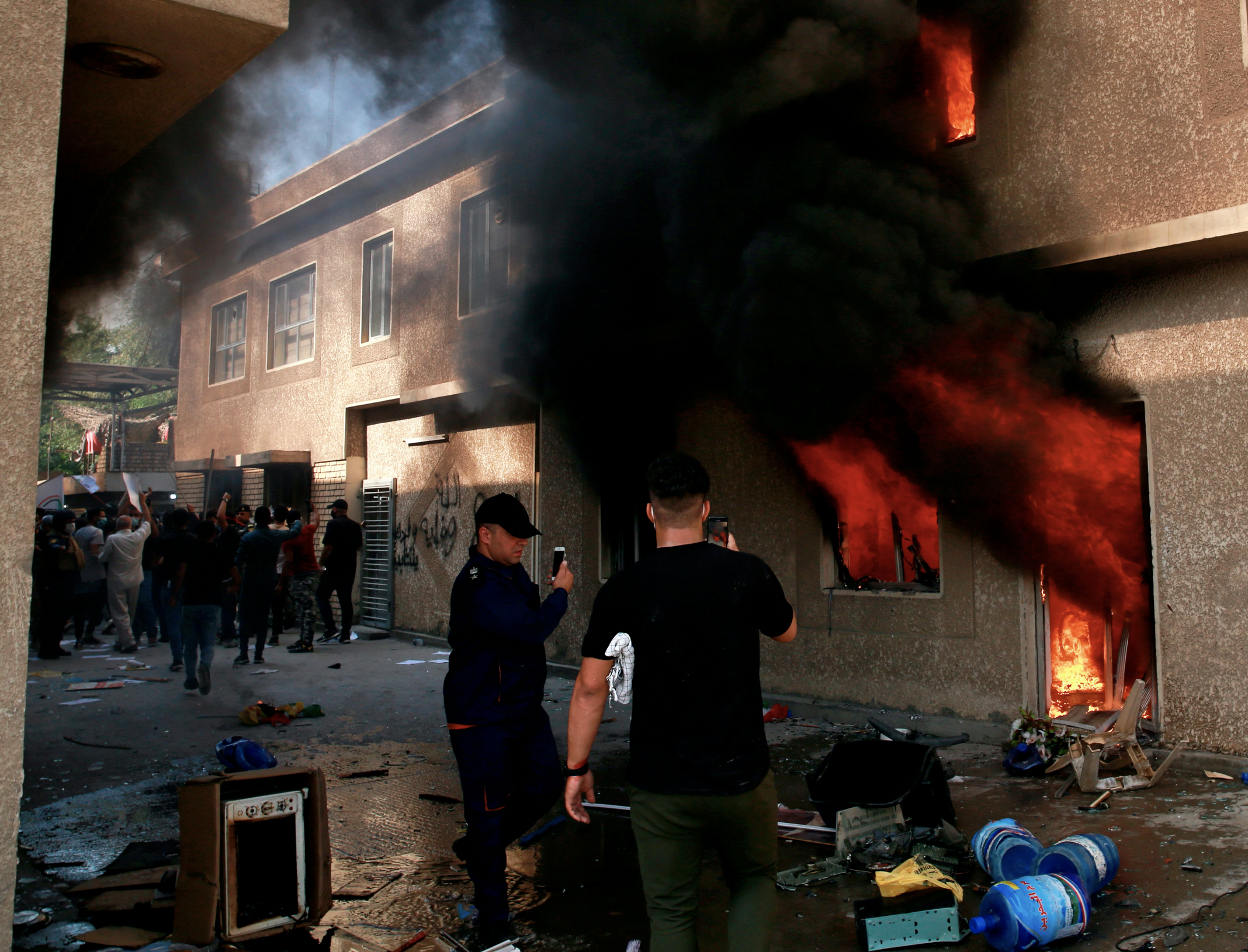The militias are actually part of an official government paramilitary force, but they have so many brigades and units that they behave like a shadow state.
An attack on a Kurdish political party in Baghdad on Saturday, followed by the murder of civilians in Balad in Iraq, has led to concerns that pro-Iranian militias are out of control.
The militias, often called Hashd al-Sha’abi or Popular Mobilization Units, are actually part of an official government paramilitary force, but they have so many brigades and units that they not only behave like a shadow state, when there are incidents, each unit can also feign not being responsible.
The attack on the Kurdistan Democratic Party office in Baghdad was a show of force by groups in Iraq who are hostile to the leading Kurdish party. It was also likely an attempt by Iran to send a message to the Kurdish autonomous region that it should not ally too closely with the US if it didn’t want to risk being targeted again.
Pro-Iranian groups have done this before. At the end of September, militia leaders led men to attack the US Embassy in Baghdad when under the guise of popular protests, they ransacked the security belt around the embassy compound. Days later, US President Donald Trump ordered the strike in Baghdad that killed IRGC Quds Force leader Qasem Soleimani and Iraqi Kataib Hezbollah militia leader Abu Mahdi al-Muhandis. Washington alleged they were planning further attacks on the US.
Unlike the US, that has drones and F-35s, the Kurdish autonomous region has to play a more delicate and complex role in Iraq. It has two international airports and is an important economic corridor to Turkey, that has helped it sustain itself and thrive while other parts of Iraq suffered ISIS genocide, insurgency and sectarian clashes over the past decade.
However, the Kurdish region also has a role in Baghdad. The foreign minister is Kurdish and a member of the KDP. The president is also Kurdish, with roots in the second largest Kurdish party, PUK. Kurds, therefore, play a prominent role in Iraq.
The PMU supporters who attacked the Kurdish party headquarters in Baghdad did so with impunity, and apparent collaboration, or at least the purposeful “looking the other way” of security forces. This is a trend in Iraq where the multi-layered and numerous security forces appear to enable the PMU to do whatever it wants.
For instance, a year of dozens of rocket attacks allegedly carried out by Kataib Hezbollah and other groups has gone unpunished in Iraq. In June when Iraqi Prime Minister Mustafa al-Kadhimi tried to use the counter-terrorism service to detain Kataib members, the PMU members were released days later anyway.
KURDISH OFFICIALS have condemned that attack and called on Baghdad to investigate. However, other incidents make this seem connected to rising intimidation and human rights abuses in Iraq. A reporter from the Kurdish channel Rudaw was also attacked by security forces, and others were detained.
The same day, the bodies of ten people were found in Iraq’s Salahuddin (Saladin) province. They were Sunni Arabs who had been abducted and executed. This is a reminder of sectarian massacres of the past that have been carried out by ISIS and Shi’ite militias. The victims in this case were said to be members of Sunni “tribal forces.”
Reports indicate that the area in Balad where the men were abducted and killed is controlled by Asaib Ahl al-Haq, a member of the PMU. Asaib is run by Qais Khazali, who was a detainee of the US at Camp Cropper more than a decade ago. He and his brother have been sanctioned by Washington. As with the attack on the KDP in Baghdad, the local political leaders have called on the government to investigate the killings.
The governor of Salahuddin told the media that his province has too many overlapping security forces. The PMU runs its own checkpoints and there is the Salahuddin Operations Command, federal and local police, Samarra Operations Command and other units from the Interior and Defense ministries.
The Federal Police and the PMU are mostly Shi’ite while the province is primarily Sunni; a history of sectarian violence hangs over these relationships.
The chaos, lack of investigations, killings and attacks on minorities in Iraq does not bode well. The US and Iraq are having strategic dialogue and America has drawn down troops from 5,000 to 3,000. The US handed over eight facilities to the Iraqis while it continues to try to support Iraqi operations against ISIS. The US has moved forces to Erbil; on September 30, a rocket was fired at Erbil Airport from a PMU-controlled area in Nineveh near Mosul.
Iranian-backed groups want the US to leave Iraq. Over the past year there have been protests in Iraq against corruption, with the PMU also being accused of killing protesters. The country is also still trying to stabilize Sinjar – where ISIS committed genocide against Yazidis – with a new deal agreed to this month.
Taken together, the attacks, protests, rocket fire and other incidents show that the government has little control over a swath of its own security forces.

